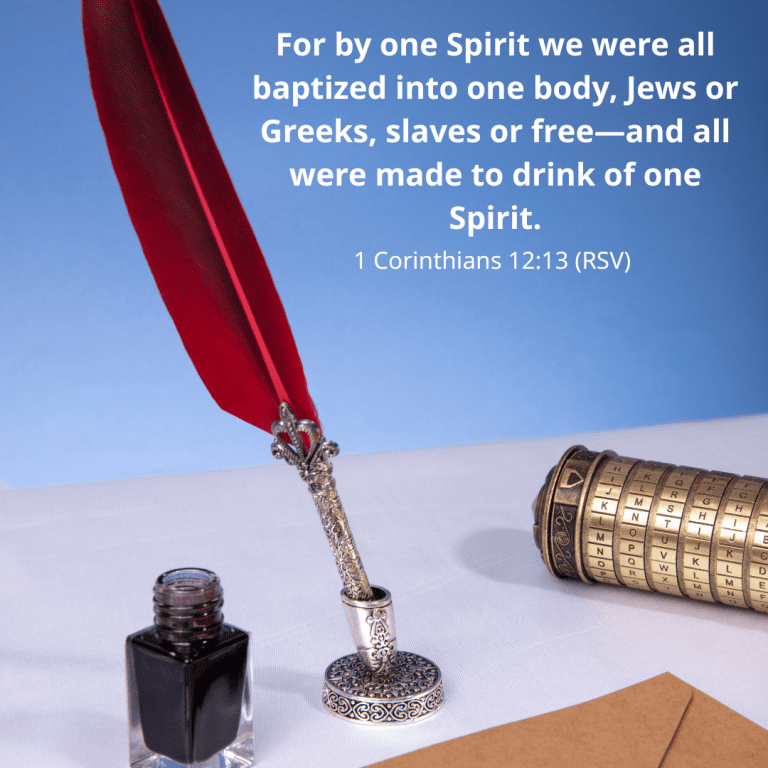
The Holy Spirit is a vital part of the Christian faith, yet many believers struggle to understand who He truly is and what role He plays in their lives. In this article, we will explore the identity of the Holy Spirit using seven powerful Bible verses to help deepen our understanding.
1. The Holy Spirit as Comforter and Advocate
John 14:16-17 (RSV) – “And I will pray the Father, and he will give you another Counselor, to be with you for ever, even the Spirit of truth, whom the world cannot receive, because it neither sees him nor knows him; you know him, for he dwells with you, and will be in you.”
Jesus promised His disciples that the Holy Spirit would come as an Advocate—someone who stands by us, guiding and comforting. The Holy Spirit is not just a distant force but a constant presence who supports and defends believers.
2. The Spirit of Truth
John 16:13 (RSV) – “When the Spirit of truth comes, he will guide you into all the truth; for he will not speak on his own authority, but whatever he hears he will speak, and he will declare to you the things that are to come.”
The Holy Spirit is referred to as the Spirit of Truth because He leads us into a deeper understanding of God’s Word and His will. This guiding role helps believers discern right from wrong and stay aligned with God’s purposes.
3. The Giver of Power
Acts 1:8 (RSV) – “But you shall receive power when the Holy Spirit has come upon you; and you shall be my witnesses in Jerusalem and in all Judea and Samaria and to the end of the earth.”
One of the most significant roles of the Holy Spirit is empowering believers to be witnesses for Christ. Through His power, we are not only transformed internally but also equipped to spread the message of the Gospel with boldness.
4. The Divine Teacher
John 14:26 (RSV) – “But the Counselor, the Holy Spirit, whom the Father will send in my name, he will teach you all things, and bring to your remembrance all that I have said to you.”
The Holy Spirit is our Teacher, helping us understand and remember the teachings of Jesus. This guidance is essential as we grow in faith and navigate life’s challenges.
5. The Spirit Who Gives Life
Romans 8:11 (RSV) – “If the Spirit of him who raised Jesus from the dead dwells in you, he who raised Christ Jesus from the dead will give life to your mortal bodies also through his Spirit which dwells in you.”
The same power that raised Christ from the dead lives in believers, breathing life into our mortal bodies. This resurrection power not only brings physical renewal but also spiritual vitality.
6. The Seal of Belonging
Ephesians 1:13 (RSV) – “In him you also, who have heard the word of truth, the gospel of your salvation, and have believed in him, were sealed with the promised Holy Spirit.”
The Holy Spirit marks us as belonging to God. This seal is a guarantee of our inheritance in Christ and serves as a constant reminder that we are His.
7. The Spirit Who Unites
1 Corinthians 12:13 (RSV) – “For by one Spirit we were all baptized into one body—Jews or Greeks, slaves or free—and all were made to drink of one Spirit.”
The Holy Spirit unites believers into one body, transcending racial, social, and cultural differences. Through the Spirit, we become one in Christ, fostering unity within the church.
Embracing the Holy Spirit
Understanding who the Holy Spirit is transforms how we live out our faith. He is not just a divine presence but a Comforter, Advocate, Teacher, and Source of power and unity. As we walk with Him daily, we experience His guidance and embrace the life He offers.
May we continually seek a deeper relationship with the Holy Spirit, allowing His influence to shape every aspect of our lives.
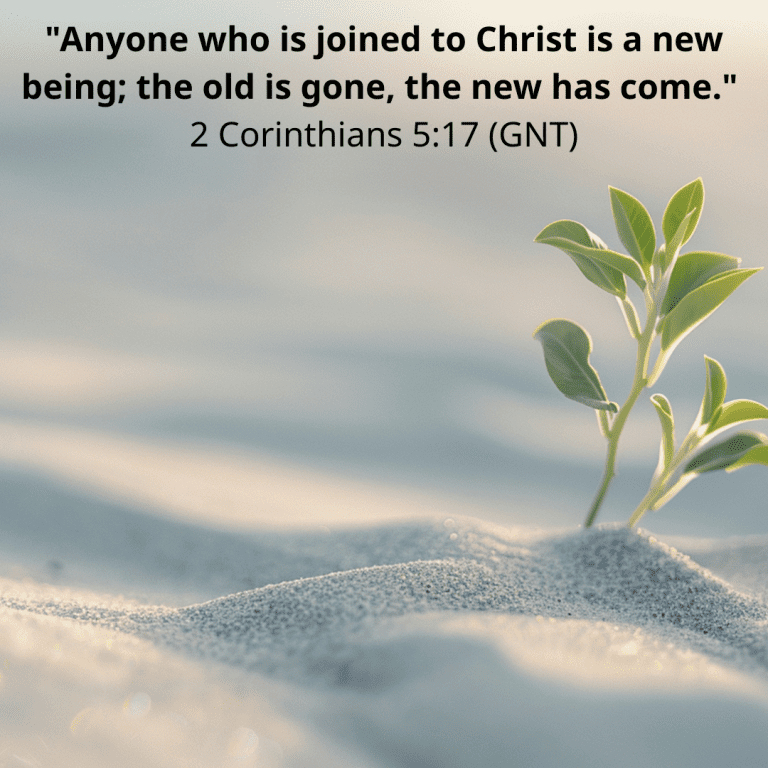
Easter is a time of deep reflection and celebration. It reminds us of Jesus’ sacrifice and the incredible gift of salvation we have through His death and resurrection. The cross is more than a symbol—it is the turning point of history, where love overcame sin and life triumphed over death. Let’s explore seven key Bible verses that reveal the power and meaning of the cross.
1. The Cross Shows God’s Love
“But God has shown us how much he loves us—it was while we were still sinners that Christ died for us!” – Romans 5:8 (GNT)
The cross is the greatest proof of God’s love. Jesus didn’t wait for us to be perfect; He gave His life while we were still lost in sin. His love is unconditional, reaching out to everyone, no matter their past.
2. The Cross Brings Forgiveness
“He canceled the unfavorable record of our debts with its binding rules and did away with it completely by nailing it to the cross.” – Colossians 2:14 (GNT)
Because of Jesus, our sins are wiped clean. The cross is where our burdens are lifted, where guilt is removed, and where we receive complete forgiveness. No sin is too great for God’s mercy!
3. The Cross Brings Peace
“And God was pleased for him to make peace by sacrificing his blood on the cross, so that all beings in heaven and on earth would be brought back to God.” – Colossians 1:20 (GNT)
Sin separated us from God, but the cross restored our relationship with Him. Through Jesus’ sacrifice, we are no longer enemies of God but His beloved children.
4. The Cross Gives Us New Life
“Anyone who is joined to Christ is a new being; the old is gone, the new has come.” – 2 Corinthians 5:17 (GNT)
The cross is not the end—it is the beginning of new life. Jesus’ death and resurrection open the door for us to be transformed, leaving behind our past and stepping into a new identity in Christ.
5. The Cross Gives Us Victory
“And on the cross Christ freed himself from the power of the spiritual rulers and authorities; he made a public spectacle of them by leading them as captives in his victory procession.” – Colossians 2:15 (GNT)
What seemed like a defeat was actually a victory! On the cross, Jesus overcame sin, death, and the powers of darkness. Because of Him, we can walk in freedom, knowing that no force of evil can separate us from God.
6. The Cross is a Call to Follow
“Then Jesus said to his disciples, ‘If any of you want to come with me, you must forget yourself, carry your cross, and follow me.'” – Matthew 16:24 (GNT)
Jesus invites us to take up our cross—not to suffer as He did, but to surrender fully to God’s will. True discipleship means letting go of selfish desires and living a life that honors Him.
7. The Cross Gives Us Eternal Life
“For God loved the world so much that he gave his only Son, so that everyone who believes in him may not die but have eternal life.” – John 3:16 (GNT)
The cross is the bridge to eternal life. Jesus’ sacrifice was not just for this world, but for eternity. Through Him, we have the promise of life that never ends—a life in the presence of God forever.
Conclusion: Embracing the Power of the Cross
As we celebrate Easter, let’s not just remember the cross—let’s live in the power of what Jesus accomplished. The cross brings love, forgiveness, peace, new life, victory, and the hope of eternity.
This Easter, may we draw closer to Christ, embracing the fullness of His sacrifice and the joy of His resurrection. He is risen! Hallelujah!

John 5:1-3 “Some time later, Jesus went up to Jerusalem for one of the Jewish festivals. Now there is in Jerusalem near the Sheep Gate a pool, which in Aramaic is called Bethesda, and which is surrounded by five covered colonnades. Here a great number of disabled people used to lie—the blind, the lame, the paralyzed.”
At the Pool of Bethesda, a multitude of sick and disabled people waited for healing. They believed that the waters of the pool had the power to heal, but many remained unhealed, waiting for their opportunity.
Reflection Questions:
- Have you ever felt like you are waiting for healing or relief from a difficult situation?
- How does the image of the sick waiting by the pool relate to your own moments of waiting for God to intervene?

Loneliness is a common human experience, but the Bible offers numerous verses that provide comfort, hope, and encouragement. Here are seven Bible verses to help you when you are feeling lonely:
- Psalm 23:4
“Even though I walk through the darkest valley, I will fear no evil, for you are with me; your rod and your staff, they comfort me.”
God reminds us of His presence in our darkest moments. Even when we feel alone, God is with us, providing comfort and guidance. - Deuteronomy 31:6
“Be strong and courageous. Do not be afraid or terrified because of them, for the LORD your God goes with you; he will never leave you nor forsake you.”
God will never abandon us. His constant presence gives us the strength to face our fears and overcome loneliness. - Isaiah 41:10
“So do not fear, for I am with you; do not be dismayed, for I am your God. I will strengthen you and help you; I will uphold you with my righteous right hand.”
God reassures us that He is always with us, providing strength and support in times of need. - Matthew 28:20
“And surely I am with you always, to the very end of the age.”
Jesus’ promise to be with us always is a source of great comfort, reminding us that we are never truly alone. - Psalm 68:6
“God sets the lonely in families, he leads out the prisoners with singing; but the rebellious live in a sun-scorched land.”
God cares for the lonely. He places them in families and communities where they can find companionship and support. - John 14:18
“I will not leave you as orphans; I will come to you.”
Jesus promises not to leave us alone, but to come to us, ensuring that we are never abandoned. - 2 Corinthians 1:3
“Praise be to the God and Father of our Lord Jesus Christ, the Father of compassion and the God of all comfort”
God’s comfort in our times of loneliness enables us to comfort others, creating a supportive community of care and compassion.
These verses offer reassurance of God’s unwavering presence and love, helping us navigate feelings of loneliness with faith and hope.

Unity is a fundamental principle deeply rooted in the Bible, emphasizing the strength, harmony, and spiritual growth that comes from being united in faith and purpose. Here are seven powerful Bible verses that highlight the importance of unity and the divine blessings that flow from it.
1. Psalm 133:1
“How good and pleasant it is when God’s people live together in unity!”
Unity among God’s people is seen as something good and pleasing, reflecting God’s desire for His followers to live in peace and mutual support.
2. John 17:22
I have given them the glory that you gave me, that they may be one as we are one.
Jesus emphasizes the importance of unity among His followers. He prays for believers to be united just as He is with the Father.
3. Ephesians 4:3
“Make every effort to keep the unity of the Spirit through the bond of peace.”
We are all part of one body with one hope, one Lord, one faith, and one God. We should therefore preserve this unity.
4. 1 Corinthians 1:10
“I appeal to you, brothers and sisters, in the name of our Lord Jesus Christ, that all of you agree with one another in what you say and that there be no divisions among you, but that you be perfectly united in mind and thought.”
God does not like divisions. Unity is essential for presenting a cohesive and powerful witness to the world.
5. Colossians 3:14
“And over all these virtues put on love, which binds them all together in perfect unity.”
Love is identified as the ultimate virtue that holds everything together in perfect unity.
6. Romans 12:5
So in Christ we, though many, form one body, and each member belongs to all the others.”
Unity in diversity means each one is important in their own way and we need each other in every way.
7. Philippians 2:2
Then make my joy complete by being like-minded, having the same love, being one in spirit and of one mind.”
Unity brings joy and completeness. We are all encouraged to cultivate a peaceful and loving community.

In a mother’s arms, love does flow,
As gentle as the winds that blow,
In her embrace, we come to know,
God’s love, a seed she helps us sow.
She speaks with wisdom, kindness too,
In all she does, her love shines through,
Her children rise and call her true,
Her husband praises her, it’s true.
(Proverbs 31:26-28)
For you formed me, my inward parts,
You covered me in my mother’s heart,
I will praise You, for I am fearfully made,
Marvelous are Your works, my soul will not fade.
(Psalm 139:13-14)
Children, obey your parents in the Lord,
For this is right, according to His word,
Honor your father and mother, too,
So your days may be long and true.
(Ephesians 6:1-3)
Love is patient, love is kind,
In a mother’s heart, these virtues bind,
Love bears all things, hopes all things too,
In her love, we find life anew.
(1 Corinthians 13:4-7)
Even in His dying hour,
Jesus entrusted to His power,
His mother dear, a sacred flower,
In love, He gave her to another.
(John 19:26-27)
My soul magnifies the Lord,
My spirit rejoices, in Him adored,
For He has looked on His maidservant’s state,
Behold, henceforth, all generations call me blessed, great.
(Luke 1:46-48)
So on this day, we honor you,
A mother’s love, forever true,
In every smile, in every tear,
Your love, a treasure we hold dear.
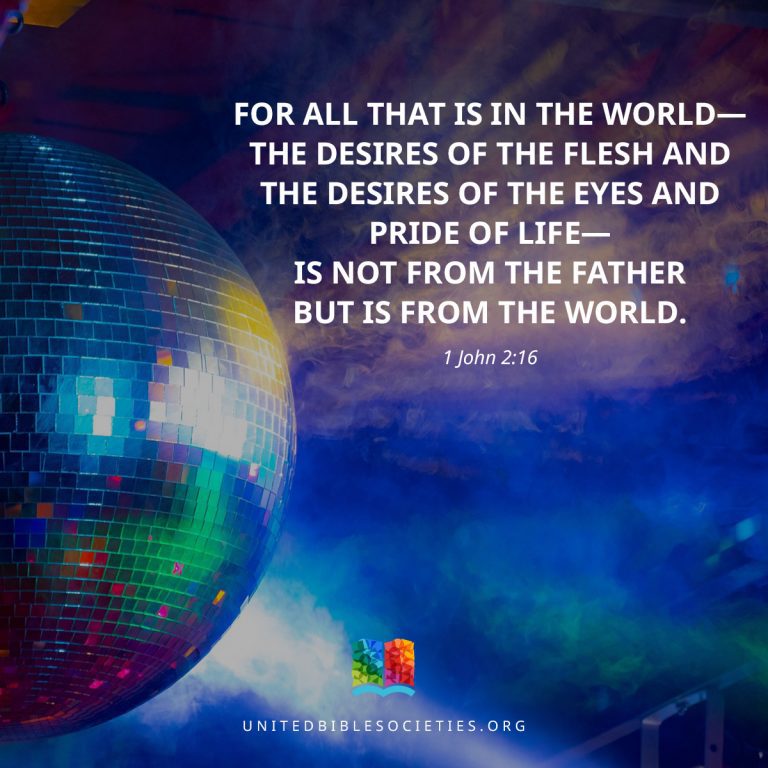
Addictions come in many shapes and forms, whether it’s lust, alcohol, substances, gambling, gaming, or even excessive use of your mobile phone and social media. There is professional help to get as well as counselling from your priest or pastor.
Also, read the Bible and lay your addiction before God in prayer. Here are some passages from the Word of God to reflect upon.
- James 1:14-15 But each person is tempted when he is lured and enticed by his own desire. Then desire when it has conceived gives birth to sin, and sin when it is fully grown brings forth death.
We all have weaknesses within us that can make us fall and lead to an addiction. Acknowledging this, and admitting that you struggle with addiction is an important step to be free from it.
- 1 John 2:16 For all that is in the world—the desires of the flesh and the desires of the eyes and pride of life—is not from the Father but is from the world.
Addictions don’t come from God, but from the world and our desires, lusts and pride. We can rely on God wanting us to be free from any addiction.
- 1 Corinthians 10:13 No temptation has overtaken you that is not common to man. God is faithful, and he will not let you be tempted beyond your ability, but with the temptation he will also provide the way of escape, that you may be able to endure it.
You may feel that you can’t break your addiction. But the Bible tells us that God can. God will provide the way of escape. Turn to God, turn from your addiction. Let God fill you with his presence.
- 1 Corinthians 6:12 “All things are lawful for me,” but not all things are helpful. “All things are lawful for me,” but I will not be dominated by anything.
Addiction is many times when something takes control over you. Those things that are not helpful in your life and dominate your thoughts and desires you may need to cut out of your life.
- 1 Peter 2:11 Beloved, I urge you as sojourners and exiles to abstain from the passions of the flesh, which wage war against your soul.
Addictions come from this world and not from God. In the end, addictions replace God as the number one in our lives. It’s not just about addictions, but also about our souls.
- Matthew 6:13 And lead us not into temptation, but deliver us from evil.
Lay your struggles before God. Ask for God’s protection and deliverance.
- John 8:36 So if the Son sets you free, you will be free indeed.
This is the promise of Jesus Christ, that when he sets us free, it is real freedom.
This article is not intended as a replacement for medical or therapeutic help or treatment for addiction, but a complement and inspiration to those who battle addiction.
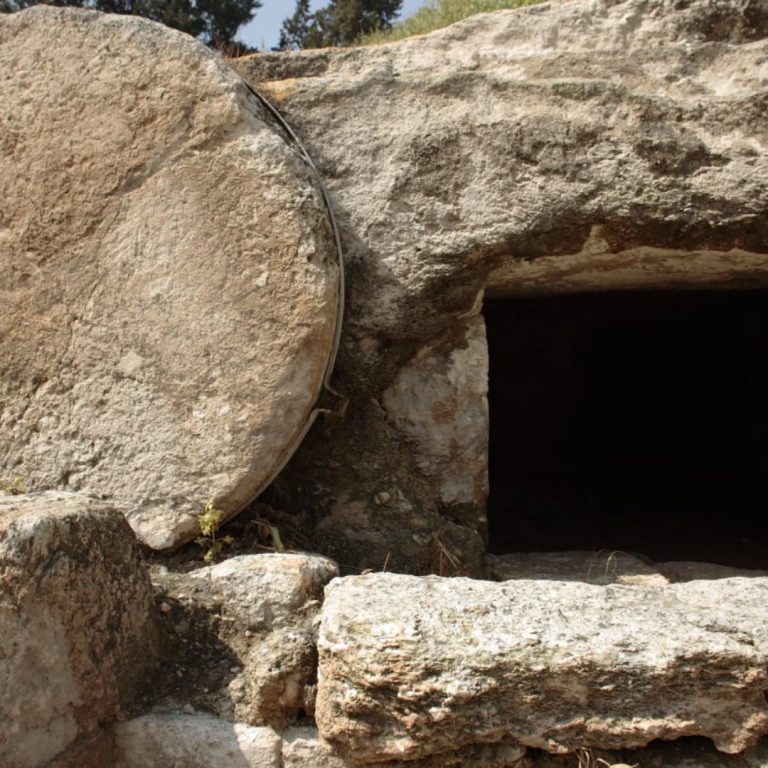
Easter, the cornerstone of the Christian faith, holds a profound significance for believers worldwide. Beyond its traditional observance, Easter offers a timeless message of hope, renewal, and redemption—a message that resonates deeply with every generation. In an era marked by uncertainty and rapid change, the timeless truths of Easter provide a steadfast anchor for young hearts seeking meaning and purpose.
In today’s fast-paced world, where digital distractions abound and societal norms constantly evolve, people often grapple with questions of identity, belonging, and purpose. Easter, with its celebration of Christ being raised from the dead, offers a totally cool story of how things change and get fresh again, a reminder of what really took place in Jerusalem that speaks directly to the challenges and aspirations of the current generation.
The Promise of a fresh start:
At the heart of Easter lies the promise of a fresh start, a promise fulfilled through the sacrificial love of Jesus Christ. As the Apostle Paul writes in Romans 5:8 (ESV), “but God shows his love for us in that while we were still sinners, Christ died for us.” The crucifixion of Jesus, foretold in the scriptures, serves as the ultimate expression of God’s boundless mercy and grace, offering you the gift of reconciliation and forgiveness. Easter’s message offers the promise of a fresh start and a renewed sense of purpose.
Hope Amidst Uncertainty:
In a world plagued by uncertainty and unrest, Easter offers a signal of hope. The resurrection of Jesus Christ reminds you that even in the darkest of times, there is light and life beyond the shadows. As you navigate the difficulties of modern life, the promise of Easter serves as a source of comfort and assurance, guiding you through moments of doubt and despair.
1 Peter 1:3 (ESV) : “Praise be to the God and Father of our Lord Jesus Christ! In his great mercy he has given us new birth into a living hope through the resurrection of Jesus Christ from the dead,”
The Promise of Eternal Life:
Easter holds forth the promise of eternal life, a hope that surpasses the boundaries of time and space. Jesus declares in John 11:25-26 (ESV), “Jesus said to her, “I am the resurrection and the life. Whoever believes in me, though he die, yet shall he live, and everyone who lives and believes in me shall never die. Do you believe this?. Through His resurrection, Jesus offers the assurance of life beyond the grave, inviting you into a relationship marked by joy, peace, and everlasting fellowship with God.
The Call to Renewal:
Easter extends a timeless invitation to renewal, a call to embrace the life-changing power of Christ’s resurrection in your own life. As Paul writes in 2 Corinthians 5:17 (ESV), “Therefore, if anyone is in Christ, he is a new creation. The old has passed away; behold, the new has come.” Just as Christ emerged from the tomb in glorious resurrection, you too are invited to cast off the shackles of sin and embrace the abundant life that comes through faith in Him.
Conclusion:
As you journey through the Easter season, may you pause to reflect on the profound truths found within the Word of God. May you embrace the promise of redemption, rejoice in the triumph of resurrection, and respond to the call to renewal with a heart full of faith and gratitude. And may the timeless message of Easter continue to inspire and uplift you, bringing you even closer to the love and grace of our Risen Savior.

How does the Bible view women? At face value, some of its messages and examples can seem oppressive or devaluing. But when you learn more about how Jesus responded to the Bible’s historical and cultural context, you may rethink your first impressions. Christ entered into a specific time and culture that had assumptions very different from ours. How can understanding the biblical context inform our reading? How can the context help us to better understand who Jesus is—what he values, loves, and expects of his followers? Take a look, traveling all the way back to the culture Jesus entered.
How the Greeks Viewed Women
Let’s begin with the philosophers. Writers and thinkers often infuse a culture with certain beliefs—and this was especially so in the Greco-Roman world. When examined closely, some of their ideas may seem surprisingly antiquated to the modern reader.
For example, the revered philosopher Plato believed that women should be confined to the home while men tended to the business of state and commerce. Aristotle went even further, teaching that women were inferior to men, incapable of abstract thought, and emotionally volatile. Thus husbands and fathers were to rule over their wives and daughters. This thinking reflects the basic attitude toward women during the classical period.
How did these attitudes affect a woman’s life? The picture is not a pretty one. A young Greek girl is routinely married off to an older man. Her husband is free to take a concubine, and romantic love is not expected within marriage. Her role is to bear and raise children and run the household. She will rarely leave the house. Her education is limited to learning domestic tasks. She is not permitted to vote or hold property. Why would she be? As Euripides the playwright notes, “A woman is handicapped by intellect.” Thucydides helps him along by writing, “The name of a decent woman, like her person, should be shut up in the house.”
How the Jews Viewed Women
By Jesus’s time Greek ideas—including these ideas about women—had gradually crept into Jewish culture, despite Old Testament writings to the contrary. In the creation account in Genesis, God creates human beings as both male and female, giving them co-equal stewardship over the earth (Genesis 1:26-30). Throughout the Old Testament, women are given equal access to God’s law and held equally responsible to keep it.
The Old Testament record is replete with women whose great courage often surpasses that of the men around them. The stories of Miriam, Rahab, Ruth, Deborah, Hannah, Abigail, and Esther are prime examples of women whose insight and fortitude greatly influence the biblical narrative and the way God’s people understood themselves.
The Jewish understanding of women was so affected by exile, conquest, and trade that by Jesus’s time women were discouraged from studying Torah, God’s law, and encouraged to stay home to fulfill household duties. They attended synagogue assemblies seated separately from the men. The Greek-educated Jewish philosopher Philo, a contemporary of Jesus, saw women as having weak judgment and considered them unfit to learn the law. Some rabbis even went so far as to encourage men to limit their conversations with their own wives. What was the point of talking to someone with little knowledge of the law?
How Jesus Viewed Women
Into this distortion of God’s original intent for women comes a new teacher, the rabbi called Jesus of Nazareth. What do we know about Jesus’s relationships with women? Did he hold the same opinions as his culture? Let’s take a look at a few of his encounters with women.
Jesus speaks to a Samaritan woman in public (John 4:4-30)
Jesus shocks the woman at the well by asking her for a drink. Thus he steamrolls over cultural taboos against men speaking to women as well as Jewish prejudice against Samaritans. “You are a Jew and I am a Samaritan woman. How can you ask me for a drink?”
Jesus then reveals himself to her as the Messiah and the giver of the living water for which she longs.
Jesus teaches a woman one-on-one (Luke 10:38-42)
Women were not expected to study Torah, yet this renegade rabbi singles out one woman and opens Scripture to her. Mary “sat down at the feet of the Lord and listened to his teaching.” This position was that of the traditional rabbinic student.
When her sister complains about needing help, Jesus tells her that “Mary has chosen what is better, and it will not be taken away from her.”
Jesus comforts a widow and confronts death (Luke 7:11-17)
“Don’t cry,” Jesus says to a grieving widow whose son lies dead in his coffin. He touches the coffin, defying ceremonial law. Jaws drop in amazement as the young man sits up and begins to speak. Jesus gives the widow’s son back to her, alive and well.
Jesus touches an “unclean” woman (Luke 8:43-48)
Ceremonially unclean due to a chronic hemorrhage, a woman touches the hem of Jesus’ cloak. “Daughter,” Jesus speaks tenderly. “Your faith has healed you. Shalom.”
Jesus touches an infirm woman (Luke 13:10-16)
The religious leaders object to Jesus’s laying his healing hands on a crippled woman on the Sabbath.
“You hypocrites!” Jesus does not mince words. “Any one of you would untie your ox or your donkey from the stall and take it out to give it water on the Sabbath.Now here is this descendant of Abraham whom Satan has kept in bonds for eighteen years; should she not be released on the Sabbath?”
Jesus deals with a woman caught in adultery (John 8:1-11)
The woman’s accusers are silenced by Jesus’s words, “Whichever one of you has committed no sin may throw the first stone at her.” But he is gentle in his conversation with her.
Jesus allows Mary to anoint him (John 12:1-8)
When people are horrified at Mary’s extravagant outpouring of love, Jesus silences them all. Rather than rebuking her for touching him in this intimate way, he lavishes high praise on her. “Leave her alone; she’s anointing me for burial. This story will be told wherever the Gospel is preached.”
Jesus appears first to a woman after his Resurrection (John 20:11-18)
Although women were considered to be unreliable witnesses in court, Jesus assigns Mary Magdalene the task of being the first witness to the Resurrection.
Scripture’s Good News for Women
So what did Jesus really think of women? Did he touch them? Did he talk with them? Did he teach them? Did he give equal moral standing with men? Did he value them?
The record speaks for itself. First-century women in Palestine were second-class citizens. Sadly, some church leaders have still viewed and treated women in this way. But Jesus turned the tables on his culture, and his example calls us to do the same. Again and again, Jesus affirmed women’s value and dignity.
As the apostle Paul affirms in Galatians 3:26-28 (NIV): “So in Christ Jesus you are all children of God through faith, for all of you who were baptized into Christ have clothed yourselves with Christ. There is neither Jew nor Gentile, neither slave nor free, nor is there male and female, for you are all one in Christ Jesus.”

When Jesus rose from the dead, He didn’t just conquer sin and death. He also opened the door for us to live in a brand-new identity. We’re not who we used to be. We’ve been transformed, set apart, and empowered to live differently. Yet, in a world that constantly tries to define us, we need to be reminded of who God says we are.
Day 1: A New Creation
2 Corinthians 5:17 (NIV)
“Therefore, if anyone is in Christ, the new creation has come: The old has gone, the new is here!”
Reflection:
You are not your past. You are not your failures, your mistakes, or even your greatest accomplishments. In Christ, you’ve been made new. The resurrection means that your old life is buried, and what rises with Him is a redeemed you.
Day 2: Chosen and Royal
1 Peter 2:9 (NIV)
“But you are a chosen people, a royal priesthood, a holy nation, God’s special possession…”
Reflection:
You’re not invisible. God chose you. You have access to His presence like a royal priest, and He calls you His own. This isn’t based on how good you are, but on how gracious He is.
Day 3: Child of God
John 1:12 (NIV)
“Yet to all who did receive him, to those who believed in his name, he gave the right to become children of God.”
Reflection:
The resurrection isn’t just an event, it’s the doorway to a relationship. You’re not just a believer, you’re a beloved child. You have a Father who delights in you.
Day 4: God’s Masterpiece
Ephesians 2:10 (NIV)
“For we are God’s handiwork, created in Christ Jesus to do good works…”
Reflection:
You were handcrafted by God, not mass-produced by the world. You were created for purpose, unique, intentional, and beautifully equipped to reflect His glory.
Day 5: Free and Forgiven
Romans 8:1 (NIV)
“Therefore, there is now no condemnation for those who are in Christ Jesus.”
Reflection:
Shame is no longer your name. Condemnation no longer fits you. You’ve been forgiven, not because of your perfection, but because of His resurrection. Walk in freedom.
Day 6: Ambassador of Christ
2 Corinthians 5:20 (NIV)
“We are therefore Christ’s ambassadors, as though God were making his appeal through us.”
Reflection:
Your identity comes with a mission. You represent heaven on earth. In how you love, speak, and serve, you’re carrying His message to a world in need.
Day 7: Victorious in Christ
Romans 8:37 (NIV)
“No, in all these things we are more than conquerors through him who loved us.”
Reflection:
Because He rose, you rise too, not just to survive, but to overcome. You’re not a victim of your circumstances. In Christ, you’re victorious. Always.
Conclusion
You may forget who you are at times. Life may try to define you by your lowest moments. But God sees you through the lens of His Son, risen, redeemed, and radiant. When we know who we are in Christ, we begin to live like it. And when we live like it, the world sees Him in us.
You can read more about our belonging and identity here.
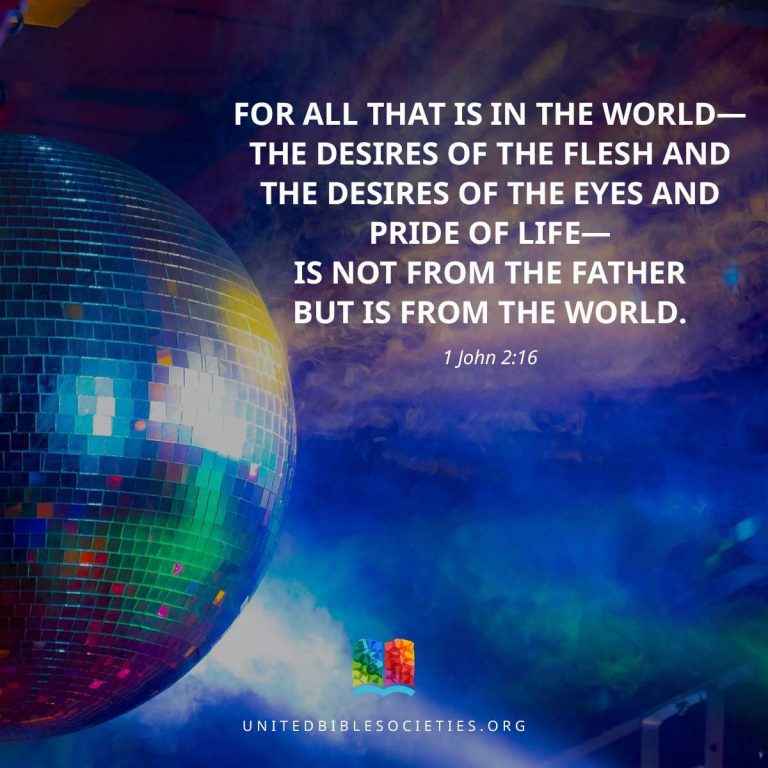
Do you know God’s grace? Here are 7 Bible verses to inspire you to understand this grace.
- Romans 3:23-24 for all have sinned and fall short of the glory of God, and are justified by his grace as a gift, through the redemption that is in Christ Jesus
To understand God’s grace, we have to acknowledge that we have done what is wrong in God’s eyes. We have sinned. We are in need of forgiveness and redemption.
- Ephesians 2:8-9 For by grace you have been saved through faith. And this is not your own doing; it is the gift of God, not a result of works, so that no one may boast.
God’s grace is a free gift that doesn’t depend on any good deeds you have done. God’s grace is for all who believe in Jesus Christ.
- James 4:6-7 But he gives more grace. Therefore it says, “God opposes the proud but gives grace to the humble.” Submit yourselves therefore to God. Resist the devil, and he will flee from you.
In humility we turn to God and confess that we have done wrong. In humility we receive God’s grace and he will lift us up.
- John 1:14 And the Word became flesh and dwelt among us, and we have seen his glory, glory as of the only Son from the Father, full of grace and truth.
God isn’t a distant God. He came to us and lived among us as one of us. Jesus is full of grace and truth.
- Hebrews 4:15-16 For we do not have a high priest who is unable to sympathize with our weaknesses, but one who in every respect has been tempted as we are, yet without sin. Let us then with confidence draw near to the throne of grace, that we may receive mercy and find grace to help in time of need.
You can come to Jesus, just as you are. He knows our weaknesses. Because of the grace of God, we are forgiven our sins.
- Titus 3:4-7 But when the goodness and loving kindness of God our Savior appeared, he saved us, not because of works done by us in righteousness, but according to his own mercy, by the washing of regeneration and renewal of the Holy Spirit, whom he poured out on us richly through Jesus Christ our Savior, so that being justified by his grace we might become heirs according to the hope of eternal life.
We don’t earn or deserve God’s grace by our good deeds, but it’s given according to God’s own mercy. By grace we are saved through our faith and even become heirs to the kingdom of God.
- Revelation 22:21 The grace of the Lord Jesus be with all. Amen.
This is the very last verse of the Bible and it reminds and expresses the wish for God’s grace be with you. “Amen” means “surely”, “truly” or “so be it.” We live by the hope and trust in God’s grace every day.

Now That He Is Risen: 7 Bible Verses to help you Rediscover Our Identity in Christ
You may forget who you are at times. Life may try to define you by your lowest moments. But God sees you through the lens of His Son, risen, redeemed, and radiant. When we know who we are in Christ, we begin to live like it. And when we live like it, the world sees Him in us.

You may forget who you are at times. Life may try to define you by your lowest moments. But God sees you through the lens of His Son, risen, redeemed, and radiant. When we know who we are in Christ, we begin to live like it. And when we live like it, the world sees Him in us.

7 Bible Verses About God’s Grace
We don’t earn or deserve God’s grace by our good deeds, but it’s given according to God’s own mercy. By grace we are saved through our faith and even become heirs to the kingdom of God.

We don’t earn or deserve God’s grace by our good deeds, but it’s given according to God’s own mercy. By grace we are saved through our faith and even become heirs to the kingdom of God.
